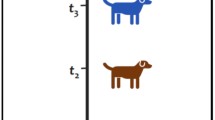Abstract
This paper considers one unique solution to the puzzle of temporal passage in the block universe. (Norton, Humana. Mente: Journal of Philosophical Studies 13:23–34, 2010) argues that, although a precise description of its workings is currently beyond our understanding, time really passes. After introducing Norton’s account, I argue that it both implies a counterintuitive relationship between the “now” and passage and that it leads to an unlikely relationship between our experience and reality. I then propose that, even if one is willing to accept these consequences, there is reason to question whether Norton builds a convincing case for the claim that, since we are not able to find any of the identifying characteristics of an illusion in the case of temporal passage, the passage of time is not an illusion.
Similar content being viewed by others
References
Dennett, D. C., & Kinsbourne, M. (2011). Time and the observer: The where and when of consciousness in the brain. Brain and Behavioral Sciences, 15, 183–201.
Maudlin, T. (2007). The Metaphysics within Physics. Oxford University Press.
Mellor, D. H. (1981). Real Time. Cambridge University Press.
Morwitz, V. G. (1997). It Seems Like Only Yesterday: The Nature and Consequences of Telescoping Errors in Market Research. Journal of Consumer Psychology, 6, 1–29.
Mozersky, J. (2015). Time, Language, and Ontology. Oxford University Press.
Norton, J. (2010). Does Really Passes. Humana. Mente: Journal of Philosophical Studies, 13, 23–34.
Price, H. (2011). The Flow of Time. In C. Callender (Ed.), The Oxford Handbook of the Philosophy of Time (pp. 276–311). Oxford University Press.
Prior, A. (1970). The Notion of the Present. Stadium Generale, 23, 245–248.
Rocchesso, D., & Guillaume, L. (2013). Evidence for a spatial basis in the perception of sequences of brief tones. The Journal of Acoustical Society of America, 133, 346–350.
Schindel, R., Rowlands, J., & Arnold, D. H. (2011). The oddball effect: Perceived duration and predictive coding. Journal of Vision, 11, 1–9.
Silberstein, M., Stuckey, W. M., & McDevitt, T. (2018). Beyond the Dynamical Universe: Unifying Block Universe Physics and Time as Experienced. Oxford University Press.
Williams, D. C. (1951). The Myth of Passage. The Journal of Philosophy, 15, 457–472.
Author information
Authors and Affiliations
Corresponding author
Additional information
Publisher's Note
Springer Nature remains neutral with regard to jurisdictional claims in published maps and institutional affiliations.
Rights and permissions
About this article
Cite this article
Ewing, K. Norton’s Objective Temporal Passage. Philosophia 50, 65–74 (2022). https://doi.org/10.1007/s11406-021-00386-8
Received:
Revised:
Accepted:
Published:
Issue Date:
DOI: https://doi.org/10.1007/s11406-021-00386-8




